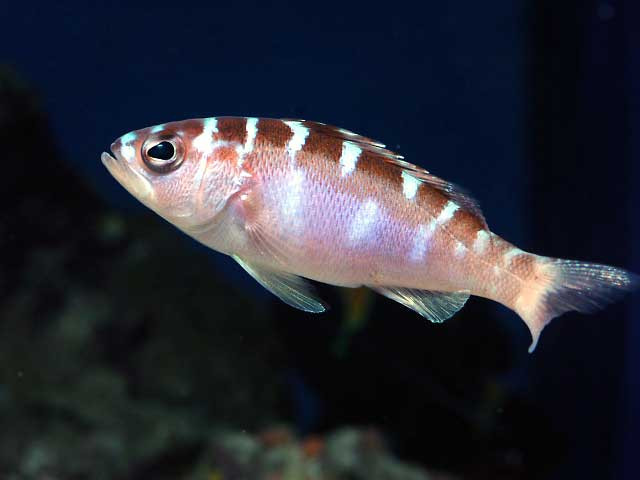Sex change fish species 20 times a day
Grouper Chalk live in small coral reefs in the Caribbean that can change sex up to 20 times a day.
According to Behavioral Ecology, fish use the "egg exchange" breeding strategy , which means laying eggs in the hole, then changing sex with your partner during the breeding process.
Mary Hart, an ecologist at the University of Florida, USA, said chalk rarely rarely spawns two batches of eggs constantly before changing the sex with a partner. This helps maintain cooperation between them and reduces fraud.
Most bisexual species change their sex in some stages of development. This is a sequential hermaphrodite case . Transformation is often motivated by social and behavioral impact. For example, when a dominant male dies. However, Chalk fish is capable of producing male and female gametes (sperm and eggs) at the same time.

Chalk Grouper (Serranus tortugarum) is a species that lives in the western Atlantic Ocean, about 8cm long.(Photo: Fishdb).
Although the duality phenomenon not only appears in Chalk fish, this phenomenon is still rare because the fish does not fertilize itself. Hart said that the reason why fish with sex change Chalk many times is still a mystery.
However, Hart said that this could bring a reproductive advantage to this fish. Transsexuals allow them to have a chance to fertilize their partner's eggs. This improves the chances of transmitting genes to the next generation of each individual.
"There are about 2% bisexual fish, in which, bisexual species only occupy a very small part. In addition, many other bisexual fish species simultaneously live in deep waters and difficult to study" , Eric Fischer, evolutionary ecology expert said. This study can provide information about the reproductive form of Chalk fish as well as other bisexual fish species.
Hart studied at the Smithsonian Tropical Research Institute, Panama, for six months. During the study, Hart found Chalk fish very "faithful".
"They stick with their partners for six months, until one of the two individuals leaves the social community," she said.
- Scientists explain the phenomenon of sex change in fish
- Freshwater species will be extinct soon
- Many fish species are 'agitated', changing mating behavior because of chemicals discharged into the sea by humans
- 10 most expensive fishes in the world
- Smaller fish because of climate change
- Whale - Fish species existed since prehistoric times
- The risk of extinction of four precious fish species in the Red River
- Some fish species live in the harshest place on earth
- A close-up of the 'extremely toxic' fishes off New Zealand
- Meet the only fish species in the world that can
- Detecting exotic rare fish in Nam Dinh
- The most beautiful aquarium fish
 Surprised: Fish that live in the dark ocean still see colors
Surprised: Fish that live in the dark ocean still see colors Japan suddenly caught the creature that caused the earthquake in the legend
Japan suddenly caught the creature that caused the earthquake in the legend A series of gray whale carcasses washed ashore on California's coast
A series of gray whale carcasses washed ashore on California's coast Compare the size of shark species in the world
Compare the size of shark species in the world Strange species in Southeast Asia becomes the first marine fish species 'extinct due to humans'
Strange species in Southeast Asia becomes the first marine fish species 'extinct due to humans'  What time of day is the easiest to fish?
What time of day is the easiest to fish?  Special uses of a highly poisonous plant that grows throughout Vietnam
Special uses of a highly poisonous plant that grows throughout Vietnam  Why are there so many giant fish flooding the Three Gorges Dam but no one dares to catch them?
Why are there so many giant fish flooding the Three Gorges Dam but no one dares to catch them?  Specialty fish 'vong bat lieu ngu' is more expensive than gold but still sought after
Specialty fish 'vong bat lieu ngu' is more expensive than gold but still sought after  Hundreds of fish jumped out of the lake in China, what happened?
Hundreds of fish jumped out of the lake in China, what happened? 